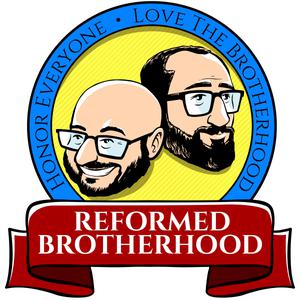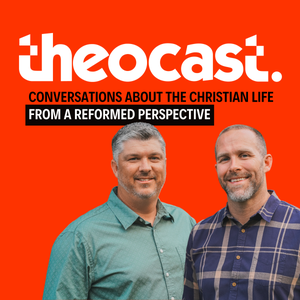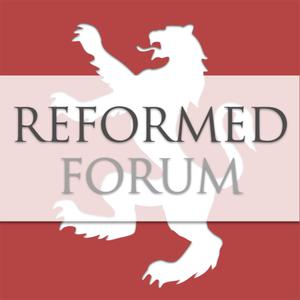
Reformed Brotherhood | Reformed Theology and Brotherly Love
Tony Arsenal and Jesse Schwamb | Society of Reformed Podcasters
Honor Everyone. Love the Brotherhood
- 1 hour 2 minutesWhy the Church is Central to Christian Life
Explore the final article of John Knox's Scott's Confession as we discuss the gifts freely given to the church, the true marks of a biblical church, and the role of the church in Christian perseverance. Dive into the importance of confession, absolution, and boldness in proclaiming the gospel. Learn how Knox's theology applies to modern church life and why the church is central to every believer's faith journey.
In this episode of the Reformed Brotherhood, Tony and Jesse conclude their series on John Knox's Scott's Confession by exploring the final article, "The Gifts Freely Given to the Church." They discuss the significance of the church as the central place where God's gifts, including the gospel, sacraments, and discipline, are administered to His people. Knox's theology highlights the role of the church in sustaining believers and ensuring their perseverance in faith through the power of the Holy Spirit. The conversation emphasizes the importance of confession and absolution as key elements of worship and spiritual renewal within the community of faith.
The brothers also reflect on Knox's prayer at the conclusion of the confession, which calls for the confounding of God's enemies, the boldness of His servants in proclaiming the Word, and the spread of the gospel to all nations. They explore how this prayer encapsulates Knox's vision for the church as a place of purity, worship, and mission. The episode considers how theology must translate into action, shaping the lives of believers and their engagement with the church.
Finally, Tony and Jesse encourage listeners to persevere in their faith by remaining actively engaged in the life of the church. They emphasize the importance of daily worship, prayer, and regular participation in the church's ministry as means by which believers are sustained and renewed in their walk with God. The discussion ties Knox’s historical theology to the challenges and opportunities faced by contemporary Christians.
Key Points:- The Church as the Center of God's Gifts: Knox emphasizes that the true church is where the Word is rightly preached, the sacraments are faithfully administered, and discipline is executed according to Scripture. The church is the primary means of grace for believers.
- Perseverance of the Saints: Knox’s theology underscores that true Christians will persevere to the end, not because of their own strength but through the sustaining power of the Holy Spirit, often mediated through the church.
- Confession and Absolution: The importance of regular rhythms of confession and the assurance of absolution within the church is highlighted as critical for spiritual renewal and growth.
- Knox’s Vision of Purity and Mission: The final prayer in the confession calls for the purity of the gospel, the boldness of the church in proclaiming it, and the spread of God's truth to all nations.
- The Role of the Church in Christian Life: The episode explores how the church is central to the believer’s faith, not just as a place of worship but as a community where believers are encouraged, challenged, and spiritually nourished.
- How does Knox’s theology challenge modern views of individualism in the Christian life?
- Why are the true marks of the church—preaching, sacraments, and discipline—so important for sustaining believers?
- In what ways can you actively participate in the life of your church to grow in your faith?
- How can Knox’s final prayer inspire your own prayers for the church and its mission?
- What role does confession and absolution play in your understanding of worship and renewal?
15 January 2025, 5:00 am - 1 hour 7 minutesSovereignty, Authority, and Prayer
In this episode of The Reformed Brotherhood, Jesse and Tony delve into Article 24 of John Knox's Scots Confession, focusing on the role and responsibilities of civil magistrates. The hosts explore Knox's perspective on the divine ordination of government structures and leaders, as well as the Christian's response to those in authority. They wrestle with Knox's strong assertions about honoring and loving civil leaders, even when their personal values or policies may seem at odds with biblical principles.
The conversation transitions into a broader discussion about how modern Christians approach the intersection of faith and politics. Jesse and Tony reflect on the tension between respecting governmental offices and responding to the individuals who occupy them, particularly when their actions conflict with Christian values. They challenge listeners to think deeply about how they pray for their leaders, emphasizing the importance of personal, specific prayers for those in authority, regardless of political or ideological differences.
The episode also revisits critical scriptural passages, such as Romans 13 and 1 Timothy 2, offering practical insights into how believers can faithfully navigate their relationship with civil authority. With a thought-provoking blend of theological reflection and practical application, this episode invites listeners to consider how they can embody Christ's love and truth in their engagement with government and leaders.
Key Points:- John Knox's Perspective on Civil Magistrates: The hosts examine Knox's assertion that civil magistrates are God's lieutenants, ordained for the preservation of order and the promotion of true religion. They analyze his strong call to honor and love those in authority, even when their actions may seem antagonistic to Christian values.
- The Christian's Responsibility Toward Leaders: The discussion emphasizes the need for Christians to respect not only governmental offices but also the individuals who occupy them. Jesse and Tony call for a more personal approach to prayer, advocating for specific intercessions for leaders' salvation and wisdom.
- Scriptural Foundations for Civil Authority: Drawing on Romans 13 and 1 Timothy 2, the episode highlights the biblical call to pray for those in authority, affirming that God's sovereignty extends to the appointment of both offices and individuals. The hosts reflect on the tension between submitting to authority and standing firm in biblical truth.
- Practical Encouragement for Believers: Jesse and Tony urge listeners to engage with their local leaders by learning their names, praying for them specifically, and even reaching out to offer spiritual support. They stress the importance of aligning civic engagement with biblical principles of love, prayer, and submission to God's sovereignty.
- How does your understanding of God's sovereignty influence the way you think about civil authorities and leaders?
- In what ways can you pray more specifically and personally for the leaders in your community?
- How can you balance honoring civil authorities while remaining faithful to biblical principles when their policies conflict with your beliefs?
- What steps can you take to engage with your local leaders and offer them spiritual support?
- How might John Knox's perspective on civil magistrates challenge or affirm your current views on faith and politics?
A Tale of Two Texts: How the Westminster Confession of Faith Was Changed by American Presbyterians to Reflect a New Understanding of the Civil Magistrate - https://www.thegospelcoalition.org/themelios/article/a-tale-of-two-texts-how-the-westminster-confession-of-faith-was-changed-by-american-presbyterians-to-reflect-a-new-understanding-of-the-civil-magistrate/
'Of the Civil Magistrate': How Presbyterians Shifted on Church-State Relations - https://www.thegospelcoalition.org/article/civil-magistrate-presbyterians/
'Of the Civil Magistrate': How Presbyterians Shifted on Church-State Relations - https://clearlyreformed.org/of-the-civil-magistrate-how-presbyterians-shifted-on-church-state-relations
8 January 2025, 5:00 am - 1 hour 4 minutesWhat It Means to Partake Worthily
In this episode of the Reformed Brotherhood, Jesse and Tony dive into the topic of sacrament eligibility, focusing heavily on the theology and practices surrounding the Lord's Supper. Beginning with a discussion on the biblical foundations of worthy participation, the hosts explore the requirements for partaking in communion, emphasizing the importance of self-examination and reconciliation within the covenant community. Drawing from 1 Corinthians 11 and the Scots Confession, they unpack the critical elements of discerning the body of Christ and evaluating one's faith and relationships before coming to the table.
The conversation extends to the role of church leadership in fencing the table, highlighting the balance between pastoral oversight and personal responsibility. Jesse and Tony emphasize that while the bar for participation in the Lord's Supper is not insurmountably high, it nevertheless requires maturity, faith, and a proper understanding of the sacrament. They also explore the broader implications of communion readiness, noting how it ties into the daily rhythms of Christian living and our relationships with God and others.
Finally, the hosts touch on the practical aspects of preparing for communion, including the importance of ongoing introspection and pastoral guidance. They encourage listeners to approach the Lord’s Supper with reverence, ensuring that it remains a time of worship, proclamation, and unity within the church. This episode serves as a thoughtful guide to understanding and practicing the Lord’s Supper in a way that honors Christ and strengthens the covenant community.
Key Points:- The Biblical Basis for Self-Examination: The hosts discuss Paul’s instruction in 1 Corinthians 11, emphasizing the need for self-examination and discernment before participating in the Lord's Supper.
- Reconciliation Within the Covenant Community: The importance of resolving conflicts and maintaining unity with fellow believers as part of preparing to partake in communion is explored in detail.
- The Role of Pastoral Leadership: Jesse and Tony highlight the role of pastors in guiding their congregations through the process of fencing the table and ensuring members are spiritually prepared.
- Communion Readiness Across Ages: The episode addresses the question of when children and new believers are ready to participate in the Lord's Supper, emphasizing spiritual maturity over age.
- The Gravity of the Lord's Supper: The hosts stress the need to approach communion with a deep understanding of its significance as both an act of worship and a proclamation of the Gospel.
- How can you prepare yourself better for the Lord’s Supper in your daily walk with Christ?
- Are there any unresolved conflicts in your life that you need to address before coming to the table?
- How can pastors and church leaders balance oversight with encouraging personal responsibility in fencing the table?
- What role does self-examination play in your spiritual life, and how does it shape your participation in communion?
- How can families and churches work together to teach children and new believers about the significance of the Lord's Supper?
18 December 2024, 5:00 am - 1 hour 1 minuteSacraments and Church Authority
In this episode of the Reformed Brotherhood, Jesse and Tony delve into the intricate topic of sacrament administration, focusing on who is authorized to administer sacraments within the church. The discussion is set against the backdrop of historical church practices and the theological underpinnings of the Reformed tradition. The hosts emphasize the importance of understanding both the form and function of sacraments, as well as the qualifications required for those who administer them.
A significant portion of the episode is dedicated to exploring the role of ministers in sacrament administration. The hosts argue that sacraments are not merely ceremonial acts but are deeply embedded in the theological and ecclesiastical framework of the church. They discuss the implications of allowing only ordained ministers to administer sacraments, pointing out the potential pitfalls of non-ordained individuals performing these sacred rites.
Throughout the episode, Jesse and Tony address common misconceptions about sacraments and highlight the necessity of adhering to proper practices as outlined in Reformed theology. They also touch upon the historical context of these practices, referencing figures like John Knox and the importance of maintaining doctrinal integrity in sacramental administration. The episode concludes with a call for listeners to reflect on their understanding of sacraments and their role within the church.
Key Points:- The necessity of ordained ministers in administering sacraments.
- The theological significance of sacraments in the Reformed tradition.
- The historical context and evolution of sacrament practices.
- The importance of proper elements and procedures in sacrament administration.
- Misconceptions about who can administer sacraments and why it matters.
- Why is it important for sacraments to be administered by ordained ministers?
- How do sacraments function within the broader framework of Reformed theology?
- What are the potential consequences of improper sacrament administration?
- How do historical practices influence contemporary views on sacraments?
- In what ways can individual congregations ensure the integrity of their sacramental practices?
11 December 2024, 5:00 am - 1 hour 2 minutesThe Assurance of Grace in the Lord's Supper
In this episode of the Reformed Brotherhood, Jesse Schwamb and Tony Arsenal delve into the theological depths of the sacraments, focusing particularly on the Lord's Supper as articulated in the Scots Confession. They explore the intricate relationship between faith and the sacraments, emphasizing John Knox's perspective on the spiritual and mystical union believers experience through the Lord's Supper. The hosts discuss how this union is not merely symbolic but a profound means of grace that assures believers of their faith and salvation.
The conversation also touches on the nature of assurance in faith, as discussed in the Westminster Confession, highlighting the tension between the assurance given by the Holy Spirit and the believer's subjective experience of it. They stress that the sacraments, while ordinary in appearance, are extraordinary in their spiritual significance when apprehended by faith, serving as a means for believers to partake in the grace of God.
Furthermore, Schwamb and Arsenal address the broader implications of sacramental theology within the church, including the importance of church discipline and the proper administration of the sacraments. They encourage listeners to reflect on their own experiences with the Lord's Supper, urging them to approach the sacrament with reverence and faith, trusting in the Holy Spirit's work to bring forth fruit in their spiritual lives.
Key Points:- The Lord's Supper is a means of grace that provides believers with assurance of their faith and salvation through a mystical union with Christ.
- The sacraments require faith to be effective, serving as more than mere symbols but as channels of divine grace.
- John Knox's theology emphasizes the importance of distinguishing between the signs and the realities they signify in the sacraments.
- Assurance of faith is a complex topic, with the Holy Spirit continually testifying to believers of their status as God's children, regardless of their subjective feelings.
- Proper administration and understanding of the sacraments are crucial for maintaining church discipline and spiritual nourishment.
- How does your understanding of the sacraments impact your experience of the Lord's Supper?
- In what ways can you cultivate a deeper appreciation for the spiritual realities signified in the sacraments?
- How does the concept of assurance in faith influence your daily walk with Christ?
4 December 2024, 5:00 am - 58 minutes 46 secondsUniting with Christ Through Communion
In Episode 422 of the Reformed Brotherhood Podcast, hosts Jesse Schwamb and Tony Arsenal embark on a thorough exploration of the Lord's Supper, focusing on its representation in the Scots Confession. They delve into the concept of "real presence," discussing how the Holy Spirit actively unites believers with Christ through the sacrament of communion. This episode sheds light on the transformative nature of the Lord's Supper, emphasizing its role in enhancing spiritual life and fostering deeper union with Christ.
Throughout the episode, the hosts tackle common misconceptions about the sacraments, clarifying that the real presence is not about the physical transformation of elements, but rather about the spiritual nourishment and union with Christ that believers experience. Jesse and Tony explore the theological significance of the sacraments within the reformed tradition, pointing out the distinctive differences between reformed perspectives and other Christian traditions such as Roman Catholicism and Lutheranism.
Listeners are encouraged to appreciate the profound spiritual dimensions of communion, understanding it as more than a symbolic act. The episode culminates in the assertion that the Lord's Supper is a powerful proclamation of the Gospel, with its efficacy not tied to the moment of administration but extending into the believer's ongoing spiritual journey.
Key Points:- The episode emphasizes the concept of "real presence" in the Lord's Supper, highlighting the role of the Holy Spirit in uniting believers with Christ through the sacrament.
- Jesse and Tony address common misconceptions, explaining that the real presence involves spiritual nourishment rather than a physical transformation of the elements.
- The hosts explore the theological significance of the sacraments in reformed theology, contrasting reformed views with those of other Christian traditions.
- The episode underscores the Lord's Supper as a Gospel proclamation, with its spiritual efficacy extending beyond the moment of administration.
- How does the concept of "real presence" in the Lord's Supper enhance your understanding of communion?
- What are the key differences between reformed and other Christian perspectives on the sacraments?
- In what ways does the Lord's Supper serve as a proclamation of the Gospel in your spiritual practice?
27 November 2024, 5:00 am - 1 hour 4 minutesTangible Grace in Baptism and Communion
In this episode of the Reformed Brotherhood Podcast, hosts Jesse Schwamb and Tony Arsenal engage in a discussion about the theology and significance of the sacraments, particularly baptism and the Lord's Supper, through the lens of John Knox's perspective as outlined in the Scots Confession. They begin by emphasizing the sacraments as more than mere symbolic acts, arguing that they play a crucial role in conferring grace and assuring believers of their salvation. This theological standpoint challenges the common view of sacraments as simple memorials or rituals, inviting listeners to explore deeper spiritual meanings.
As the conversation unfolds, the hosts delve into the historical and theological contexts of sacramental practices, drawing on confessional statements and insights from Reformed theologians like Knox. They discuss the sacraments' role in marking God's people and differentiating them from those outside the covenant, highlighting their function as visible signs of God's promises. Moreover, they address the assurance and spiritual nourishment that believers receive through these practices, emphasizing the sacraments' tangible aspects and their importance in the life of the church.
Throughout the episode, Jesse and Tony encourage listeners to reflect on the profound spiritual realities conveyed through the sacraments. They urge believers to reconsider their understanding of these sacred practices and to approach them with a heart open to receiving God's grace. By exploring the complexities of sacramental theology, the hosts aim to enrich the listeners' appreciation for the sacraments as essential components of the Christian faith and as means of experiencing God's covenant promises in a tangible way.
Key Points:- The sacraments of baptism and the Lord's Supper are more than symbols; they confer grace and assure believers of their salvation.
- John Knox's perspective from the Scots Confession emphasizes the sacraments as visible signs of God's promises and their role in distinguishing God's people.
- The spiritual nourishment and assurance provided by sacraments highlight their significance in the life of the church and encourage deeper reflection on their meaning.
- How do the sacraments of baptism and the Lord's Supper serve as tangible expressions of God's covenant promises?
- In what ways can believers experience spiritual growth through participation in the sacraments?
- How can understanding the historical and theological context of sacraments enhance one's appreciation for these sacred practices?
20 November 2024, 5:00 am - 22 minutes 35 secondsPodcast Talk with Tony and Ashley
In Episode 420 of the Reformed Brotherhood Podcast, hosts Tony Arsenal and his wife Ashley engage in a lively discussion centered around their favorite podcasts and personal anecdotes. The episode kicks off with Tony introducing Ashley as his co-host for the day, setting the stage for a relaxed and informal conversation. Ashley shares her insights on various podcasts that have captured her interest, notably highlighting her love for true crime and informative shows.
Throughout the conversation, Ashley delves into the details of her podcast recommendations, starting with "Hooked," a gripping true crime podcast about the unexpected life of a Boeing employee turned bank robber. She also discusses "Criminal," a long-time favorite known for its quirky take on lesser-known crimes. The couple transitions into discussing more personal and practical podcasts like "Focus on the Family," which offers marriage and parenting advice, and "Toddlers Made Easy," providing helpful tips for parenting young children.
In between podcast recommendations, Tony and Ashley offer glimpses into their family life, sharing humorous and heartfelt experiences. They discuss the dynamics of their home, including their toddler's recent antics and their dog's vigilant behavior. The episode wraps up with Ashley listing a few more podcast recommendations, leaving listeners with a sense of camaraderie and a wealth of new podcasts to explore.
Key Points:- Ashley's top podcast recommendations, including "Hooked" and "Criminal."
- Insights into practical podcasts like "Focus on the Family" and "Toddlers Made Easy."
- Personal anecdotes from Tony and Ashley's family life, adding a humorous touch.
- What are some podcasts that have influenced your perspective on family and relationships?
- How can listening to diverse podcast genres enhance your understanding of different topics?
- What role does humor play in your own discussions about family dynamics and everyday life?
13 November 2024, 5:00 am - 1 hour 4 minutesUnderstanding Church Councils within Reformed Theology
In this episode of the Reformed Brotherhood Podcast, Tony Arsenal and Jesse Schwamb engage in a thought-provoking discussion about the authority of church councils within reformed theology. They explore how church councils serve as a collective authority, combining the insights of individual ministers to make decisions that align with the marks of a true church. The hosts delve into the role of these councils in interpreting Scripture, addressing discipline matters, and applying biblical teachings to real-world situations. Throughout the conversation, they emphasize the Protestant struggle to balance personal interpretation of Scripture with the collective wisdom of church councils.
The discussion also touches on historical and contemporary expressions of church authority, referencing key theological figures, confessions, and the tension between individual and collective authority. Tony and Jesse candidly share their personal challenges in articulating the intricacies of reformed theology, acknowledging the complexity of the subject and the importance of ongoing theological reflection. Their conversation highlights the significance of understanding the authority of church councils in preserving the purity of the gospel and maintaining a sincere devotion to Christ.
Amidst the serious theological discourse, the episode is peppered with humor and light-hearted anecdotes, such as the idea of discussing theology over hot wings. This blend of rigorous theological exploration and relatable humor creates an engaging listening experience, encouraging listeners to delve deeper into their understanding of reformed theology and the authority of church councils.
Key Points:- Church councils serve as a collective authority in reformed theology, combining individual ministers' insights to uphold the marks of a true church.
- The hosts explore the tension between personal interpretation of Scripture and the collective wisdom of church councils in applying biblical teachings.
- The episode emphasizes the importance of understanding church councils' authority in preserving gospel purity and fostering sincere devotion to Christ.
- How do church councils contribute to maintaining the marks of a true church?
- In what ways can Protestants balance individual Scripture interpretation with collective church authority?
- Why is it important to understand the historical and contemporary roles of church councils in reformed theology?
6 November 2024, 5:00 am - 1 hour 4 minutesThe Supreme Authority of Scripture
In this episode of the Reformed Brotherhood Podcast, hosts Tony Arsenal and Jesse Schwamb explore the fundamental concept of the authority of Scripture, emphasizing its unparalleled role in guiding and shaping the lives of Christians. They discuss how elevating human interpretation above the Bible can lead to dangerous theological errors, underscoring the necessity of submitting to the Scriptures as the ultimate authority. The conversation draws on biblical references such as Psalm 19 and 2 Timothy 3 to illustrate how God's Word, inspired by the Holy Spirit, is transformative and life-giving.
The hosts delve into the role of the Holy Spirit in making the Word of God effectual, asserting that without the Spirit's illumination, the Scriptures would not have their profound impact on believers. They discuss how prayerful engagement with the Bible is essential, as it allows Christians to tap into the divine wisdom and truth contained within its pages. The episode also touches on John Knox's theology, highlighting how the character of God is mirrored in the Scriptures, which serve as a powerful tool for wisdom and salvation.
Throughout the discussion, Tony and Jesse emphasize the importance of approaching Bible study with humility and a prayerful heart. They encourage listeners to actively engage with the Scriptures, recognizing them as God's direct communication designed to equip believers for every good work. The episode serves as a call to deepen one's relationship with the Bible, allowing its teachings to shape and enrich one's spiritual journey.
Key Points:- The authority of Scripture is paramount and must be revered above human interpretation.
- The Holy Spirit plays a crucial role in making the Scriptures effectual and transformative.
- Prayerful engagement with the Bible is essential for accessing its divine wisdom and truth.
- John Knox's theology highlights the reflection of God's character in the Scriptures.
- The Bible serves as a powerful tool for wisdom and salvation, equipping believers for good works.
- How can we ensure that we are submitting to the authority of Scripture in our daily lives?
- What role does the Holy Spirit play in your personal Bible study, and how can you invite His guidance more fully?
- In what ways can prayer enhance your understanding and application of the Scriptures?
- How does recognizing the character of God in the Scriptures impact your relationship with the Bible?
- What steps can you take to deepen your engagement with God's Word and allow it to transform your spiritual journey?
How to Faith a Life (https://www.youtube.com/channel/UCJEdg8fhK0-boIiNkjUmUww)
30 October 2024, 4:00 am - 1 hour 2 minutesLove and Correction in the Church
In this episode of the Reformed Brotherhood Podcast, Tony Arsenal and Jesse Schwamb engage in a profound discussion on the subject of church discipline, examining its biblical foundations and its vital role within the Christian faith community. They delve into John Knox's perspectives, underscoring the significance of spiritual authority and the unity that discipline brings to the church. Through a thoughtful exploration, they emphasize how discipline, when enacted with love and compassion, aligns with the heart of God and serves as a manifestation of His love in the lives of believers.
Furthermore, the hosts highlight the critical responsibilities of pastors and elders in upholding church discipline. The conversation shines a light on the often unseen burdens that church leaders bear as they navigate the complexities of correcting and guiding members of their congregations. By drawing parallels to a surgeon's duty, they emphasize that discipline, much like a necessary operation, is an act of love aimed at healing and restoration.
Tony and Jesse also address the challenges faced by church leaders in maintaining confidentiality and support during disciplinary proceedings. They encourage listeners to pray for their pastors and elders, recognizing the heavy burden of leadership and the spiritual battles that accompany it. The episode serves as a call to action for congregants to support their leaders, uphold the unity of the church, and engage in the discipline process with understanding and respect.
Key Points:- Church discipline is a profound display of Christian love that aligns with biblical principles.
- Pastors and elders carry a heavy burden in managing church discipline with discretion and compassion.
- The unity of the church is intricately linked to how discipline is handled, impacting the congregation's overall health.
- How can church discipline be conducted in a way that truly reflects God's love?
- What role do congregants play in supporting their church leaders during disciplinary processes?
- In what ways can prayer and encouragement strengthen the unity of a faith community during challenging times?
23 October 2024, 4:00 am - More Episodes? Get the App
Your feedback is valuable to us. Should you encounter any bugs, glitches, lack of functionality or other problems, please email us on [email protected] or join Moon.FM Telegram Group where you can talk directly to the dev team who are happy to answer any queries.
 Theocast
Theocast
 Doctrine and Devotion
Doctrine and Devotion
 Theology Gals
Theology Gals
 Core Christianity
Core Christianity
 Reformed Forum
Reformed Forum
 White Horse Inn
White Horse Inn